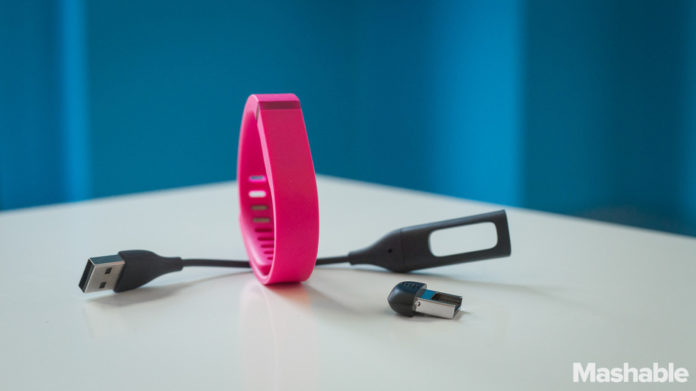Fitbit trial could be a boon for MS patients

Amateur athletes use fitness bands like the Fitbit to track their adrenaline-fueled adventures and then brag to friends. Others use the band to count their footsteps and the calories they burn. Drugmaker Biogen Idec is exploring ways to use fitness trackers to gather data from people who suffer from multiple sclerosis, an autoimmune disease that affects the brain and spinal cord.
The company, which has five MS drugs on the market, gave out 250 Fitbit bands to MS patients in the U.S. last spring to track their level of activity and sleep patterns. Mobility is affected by the disease, and Biogen says collecting data on a daily basis — about how much and how fast MS patients walk, for example — could yield data about the progression of the disease and lead to better treatments.
“Let’s say you see a patient four times a year — that’s two hours per year,” says Al Sandrock, Biogen’s chief medical officer. “You’re losing 364.9 days of other data that could be collected.”
The data also could help Biogen prove the value of its pricey medications to health insurers and pharmacy benefit managers, who are responding to rising drug prices by reducing the number of medicines covered. “It’s a smart investment,” says Tim Coetzee, chief research officer of the National MS Society. Express Scripts dropped Bayer’s MS drug Betaseron, directing patients to three other options, including Biogen’s Avonex. MS drugs cost at least $50,000 a year at wholesale prices, Coetzee says. “Having the tools to demonstrate the value of a particular agent is valuable,” he says.
“Betaseron is comparably priced to other MS treatments,” says Rosemarie Yancosek, a Bayer spokeswoman.
Decisions about which drugs to cover depend on several factors, says Express Scripts spokesman Brian Henry, including the number of drugs on the market, how they work, and their price. None of Biogen’s five MS drugs — Avonex, Fampyra, Plegridy, Tysabri, and Tecfidera — has been taken off the pharmacy benefit managers’ lists. The medicines are projected to bring in almost $8 billion in revenue this year.
Biogen’s Fitbit study, conducted with PatientsLikeMe, an online discussion platform for people with chronic diseases, tried to assess how likely patients would be to use the devices. Participants had to agree to share their data with PatientsLikeMe, which then sent the data to Biogen for analysis.
Annette Smiling, 57, a participant in the study, was won over by the band. “I tried to walk more and prove to it I was going to do better,” she says. Smiling, who lives in Cocoa, Fla., says she lost 17 pounds in the six weeks of the study. The Fitbit helped her track her sleep, which is affected by spasms caused by MS. She also shared the data with her neurologist. “He was really happy with the whole thing, because it charted everything for him.”
Rick Rudick, who’s leading Biogen’s data-gathering, says other participants’ reactions were similarly positive. Biogen plans to release the full results of the study next year.
Fitbit and other wearables hold great promise for the MS population, says Robert McBurney, president and chief executive officer of the Accelerated Cure Project for Multiple Sclerosis, a research nonprofit. He suggests the devices might someday be capable of more nuanced measurements of patients’ gait and dexterity. Especially for patients with relapsing MS, which is characterized by sporadic flareups of the disease, those measurements could be invaluable, says Biogen Chief Executive George Scangos. “I wouldn’t be surprised if in a period of time before a relapse, something changes about a patient’s movement,” he says. “Maybe it’s too subtle for them to realize, but devices can see these trends. We may be able to intervene earlier.”
Biogen also plans to gather data through an iPad app it’s developed with MS specialists at the Cleveland Clinic. The app gauges cognitive function and vision, which can be affected by the disease, using tests measuring cognitive speed that resemble video games and graphic-based tests that assess a patient’s vision. Cognitive function and vision typically aren’t regularly checked by doctors during patient visits. The Cleveland Clinic will start testing the app in the spring at its MS center.
Coetzee says patients probably will adopt the use of new technologies quickly, but MS doctors will need to understand the data and will demand to see how the tools can help them deliver better care.
Biogen CEO Scangos says he’s confident his company will be able to provide useful information to doctors, who can then “hopefully intervene earlier, and that should save the payers money and should result in better outcomes for patients.”
- Searching Social Media for Drug Side Effects
- The Art of Social Media: Guy Kawasaki Gives Advice on How to Sell Yourself
- The Gaming Industry’s Greatest Adversary Is Just Getting Started
- How Yelp Handled a Pop Star’s Social Media Attack on a Local Dry Cleaner
This article originally published at Businessweek here

